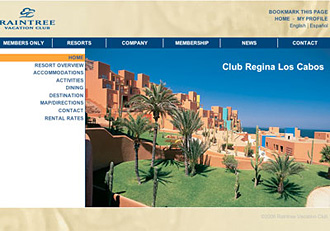
|  |  |  Travel & Outdoors | September 2008 Travel & Outdoors | September 2008  
Enticing Timeshare Test-Drives
 Melanie Lindner - Forbes Melanie Lindner - Forbes
go to original


| | Raintree Resorts: For two nights, couples can stay in one of the company's timeshare units in Cancun, Los Cabos or Puerto Vallarta for just $200 - a $600 to $800 retail value. Depending on the promotion, you may have to endure a two-hour sales pitch. For more, check out RaintreeResorts.com. | | |
A two-hour presentation isn't so bad when your vacation bill is cut in half.

Time was that timeshare marketers were considered the used-car salesmen of the real estate business: smooth talkers who dangled discounts on vacation getaways only to shanghai naive prospects into endless presentations on shoddy digs (and then maybe charging a fatter-than-advertised fee for the privilege). Worse, some investors who bought into prefinished buildings saw their investments go up in smoke when the projects ultimately failed.

By many accounts, those shenanigans have ebbed in the last 30 years - but the teaser discounts remain. And with fuel prices sky-high, the U.S. dollar still weak and recession all but a certainty, breaks on travel expenses can come in handy for cash-strapped vacationers willing to stomach a two-hour sales pitch for a week's worth of fun in the sun or on the slopes.

Not that the marketers are in the free-entertainment business. According to the American Resort Development Association, a trade group of nearly 1,000 resort operators, two out of every 10 promotional visits yield a purchase - and generally the promotions are offered only when the rooms would go empty anyway.

The timeshare model - in which investors buy access to various properties for an allotted amount of time (after which the rights revert to the original owner)--is still not terribly pervasive. Only 6 percent of U.S. households with an annual income of $45,000 or above own a timeshare unit.

But thanks to the flagging housing market and the industry's refurbished reputation, once-suspicious money is pouring in. According to Ernst & Young, sales of timeshares reached $10.6 billion in 2007, up from just $6 billion in 2003. Throw in fractional-ownership properties - governed by contracts that allow buyers to rent them out and leave them to their heirs - and the total market hits $12 billion.

"The most common problem in the old days [the 1960s an 1970s] was that the deals were technically correct, just highly misleading," says Howard Nusbaum, president of the ARDA. "They would offer you a discounted trip, but upon arriving you'd have to pay full price and [then] mail in a rebate that required complicated forms. There were so many hoops to jump through that whatever they were offering wasn't worth the effort."

Those days are history, assures Nusbaum. A series of laws passed in the early 1980s required that real estate developers present public offering statements vetted by the states where the properties were located and marketed. Undaunted, more established hospitality brands - including Marriott, Disney, Wyndham, Hilton and Starwood - have since waded into the timeshare market.

These properties aren't aimed at high-fliers - the typical timeshare buyer has an average annual household income of $82,000 - but for those craving a quick vacation on the cheap, some of the teaser promotions offer decent bang for the buck.

• The Marriott Vacation Club has timeshares in 40 locations around the globe, including Palm Beach, Fla.; Kauai, Hawaii; Aruba; Thailand and Spain. Depending on availability, prospective buyers can stay with up to four people in one of the timeshare villas - with up to three bedrooms, a kitchen with cookware, separate living and dining areas and washer/dryers - or in a hotel room at the resort, including access to pools and kids' activities.

A four-night stay for up to four people costs $300, though you must attend a 90-minute sales presentation - a small inconvenience, perhaps, for a package worth $700 at retail. For more information, visit marriott-timeshare.com.

• The promotion for Starwood's Westin Maui Resort & Spa promises couples a five-night stay at the tropical location, but participants must be "Starwood Preferred Guests" and receive an invitation.

• Wyndham offers a variety of promotional deals at its 145 timeshare locations around the world. The promotions, from free golf rounds to casino chips, are subject to availability. For those willing to stomach a two-hour pitch, Wyndham is currently pushing a two-night stay at its Myrtle Beach location, including either a $50 dining certificate or two show tickets, for just $89 - retail price: over $400. For more, check out wyndhamtrips.com.

• Breckenridge, Colo., resort Grand Lodge on Peak Seven is currently under construction, but the company is offering a promotion allowing couples to spend two nights at a nearby hotel for just $99 any time of year - a trip that retails for as much as $400 in peak ski season.

• Grand Lodge also throws in $100 worth of dining coupons for local restaurants and two free lift tickets, which retail at $160 for the pair. All you need to do is attend a two-hour sales pitch while you're in town. For more, check out grandlodgeonpeak7.com.

• The promotion for Starwood's Westin Maui Resort and Spa promises couples a five-night stay at the tropical location. For $789, you get hotel accommodations, a $75 resort certificate redeemable for dining, shopping or spa services within the resort, plus $185 toward an Avis rental car - a package worth $2,400 retail. The catch: Participants must be "Starwood Preferred Guests" and receive an invitation. For more information, check out westinmaui.com. |

 |
|  |



